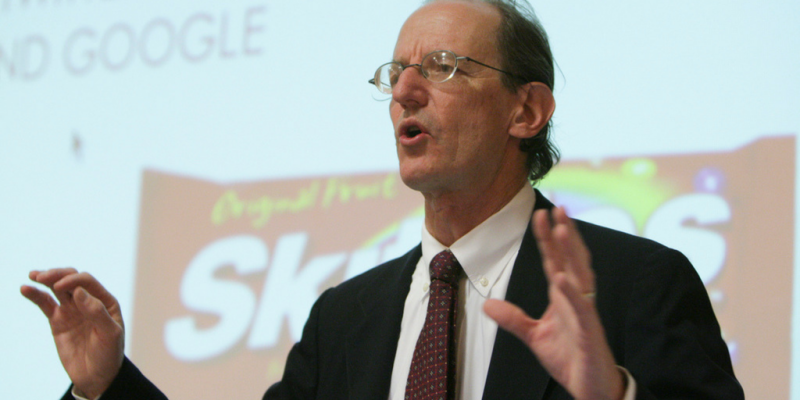
A Political Pro Talks Campaign Strategy, Per His Latest Book.
Rick Ridder chatted with us about campaign strategy and the 22 rules for campaign management outlined in his new book. Rick is the president and co-founder of RBI Strategies and Research, and the author of Looking for Votes in All the Wrong Places: Tales and Rules from the Campaign Trail. As a former presidential campaign manager and long-time political strategist with experience in American and international elections alike, Ridder has seen it all when it comes to political campaigns and campaign strategy.
1. You have 22 rules for campaign management and campaign strategy. Which one or two are the most important?
Probably the rule for candidates that is least followed, but is the most important: "Know Why You are Running." There are scores of candidates from the Mosquito Control Board to the President of the United States who are unable to cogently delineate why they are running for public office.
From a management standpoint, this translates to: Know why your candidate is running and be certain it is reflected in the campaign. I've seen campaigns where the management has one idea of what the campaign is all about, while the candidate has a very different idea.
2. Any other campaign strategy rules that didn’t make the cut for the book?
There is an implied rule in the book: "Humor is Necessary in a Campaign." Too often, campaigns are run as if the candidate is running for Pope and the only voters are the College of Cardinals. Humor in communications is important. Humor in the campaign office is also important, and please, work for a candidate who can understand and enjoy humor.
3. Did Trump’s win change your perception of some of your rules or change the way you think about campaigns in general?
It actually reinforced many of the rules, such as knowing why you are running (Make America Great Again, for example). In the book, I mention the Democrats’ desire (need) to talk tactics such as GOTV capabilities in the last weeks of a campaign. I would now make that into a rule: Never talk tactics. Nobody cares. This only takes you away from focusing on message and strategy.
For 18 months, we heard about the Clinton campaign's web operation, field operation, analytics team, research technology, and on and on. Hell, somewhere there must be a story on the required thread count for the sheets in a hotel when Hillary slept there. But there was no message, and the strategy was reflective of the Generals’ strategy in the movie "A Bridge Too Far."
4. Which campaigns that you’ve worked on did you learn the most from? Which losses taught you the most?
I have always learned more from European campaigns than from U.S. campaigns. In Europe, the message has to be more concise because of limited TV, the communications more focused because of the shortened election period, and the definition of the contrasts greater between the candidates/parties because of the multiplicity of parties in a given election.
In terms of losses – as a very young staffer for George McGovern, I learned that voters have to want the change you want. So, in a sense I learned the important lesson, "It is not about you. It's about them - the voters."
5. What’s your favorite part about working on campaigns? Least favorite part?
My favorite part of working on a campaign is working with many like-minded individuals for an issue/organization/candidate/party in which we all believe in the same cause.
The worst part of campaigns is the ridiculous hours most senior staff think they have to put in and require their subordinates to do the same. The false sub-text is that the longer you work, the greater your capabilities. The result is too many mistakes made by a tired staff. A rule I did not put in the book, but to which I try to adhere with campaign staffs: There are no good ideas after nine at night.
6. Any campaign strategy mistakes that you particularly dwell on?
In one of my first years polling, we conducted a survey for a party caucus in a legislative district in Greeley, Colorado. The candidate was a young Hispanic man, and it was conventional wisdom that he did not have a chance in the largely white district against a favorite of the Capitol lobbying crew. Our poll came back with the Hispanic candidate 10 points down (48% to 38%) with six weeks to go. I confirmed conventional wisdom to my client upon reading the initial data. He was taken off a target list.
On Election Day, the Hispanic candidate lost the race by 12 votes.
At first, I tried to dismiss "our miss" to the margin of error - 1 out of 20 times, you will be outside the margin of error. But when I took a closer look, I found that of the 14% undecided in the race, 90% were Hispanic.
Two lessons:
1) Don't be cavalier and let conventional wisdom influence a thorough analysis of the data.
2) Minority respondents often won't tell an interviewer their voting preference.
I think about that poll every time we conduct a survey, and wonder whether if the party caucus had put a modicum of resources into the campaign, he would have won.
7. What advice do you have for young people looking to start working on campaigns?
I tell them to start out in the field. This surprises many because most young people are attracted to headquarters positions. They want to be a press secretary, the candidate's aide de camp, or a media consultant. But most of the really good operatives start out as field operatives. Why? Because field speaks to voters and listens to their concerns. So when it comes time to communicate, those who have been in the field have a better sense of the real language used to say something and what to say.